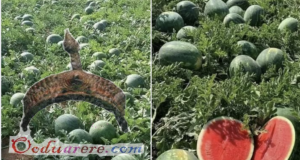The Federal Government of Nigeria, through the Ministry of Agriculture and Food Security (FMAFS), has signed a Memorandum of Understanding (MoU) with Brazil’s Fundação Getulio Vargas (FGV) to enhance agribusiness development across Nigeria’s 774 local government areas.
The agreement, signed at the FGV Headquarters in Rio de Janeiro, Brazil, on the sidelines of the G20 Leaders’ Summit, focuses on private sector development in fertiliser production, hybrid seed technology, and agricultural finance.
The Permanent Secretary of FMAFS, Mr. Temitope Fashedemi, signed on behalf of Nigeria, while the President of FGV, Professor Carlos Ivan Simonsen Leal, represented Brazil. Fashedemi highlighted that the partnership enables Brazil to collaborate with Nigeria’s growing agricultural sector.
“This partnership paves the way for Brazil to engage with Nigeria’s dynamic and rapidly growing agricultural sector. Together with FGV, we are poised to unlock the potential of private sector investment in key areas critical to our food security,” Fashedemi said.
The MoU is linked to the Green Imperative Project (GIP), a $1.2 billion collaborative initiative launched in 2018 to modernize Nigeria’s agricultural sector using Brazilian expertise in tropical agriculture.
Green Imperative project goals
The Green Imperative Project, supported by Deutsche Bank, will deliver transformative agricultural technologies and capacity-building programs over its 10-year duration. Key goals include:
- Empowering one local agribusiness in each of Nigeria’s 774 LGAs will receive technical and financial support over the next five years.
- The project is projected to draw $4.3 billion in private-sector investments in fertiliser production, hybrid seed technology, and agricultural finance.
- Nigeria aims to adopt sustainable agricultural practices and enhance food production to ensure food security.
Professor Leal emphasized Brazil’s commitment, stating, “Brazil is eager to transfer its expertise in tropical agriculture to support Nigeria’s journey towards food security and economic growth.”
The Nigerian government’s drive to boost its agricultural sector has gained significant momentum with recent partnerships aimed at transforming the industry. Brazilian meatpacking giant, JBS, has committed $2.5 billion to Nigeria’s livestock sector, while the federal government has also partnered with Mastercard to enhance financial inclusion for farmers across the continent.
- JBS signed a memorandum of understanding to establish six factories over five years—three for poultry, two for beef, and one for pork production. This investment will also include feasibility studies, budget planning, and the development of Nigeria’s local supply chain.
- In line with efforts to strengthen food security in Nigeria, the Federal Government is implementing various initiatives aimed at boosting food production and promoting sustainable agricultural practices. Senator Abubakar Kyari, the Honourable Minister for Agriculture and Food Security, outlined several key priority actions during his address.
“As part of our focus, we are prioritizing the distribution of agro-inputs to farmers, repositioning agricultural institutions, and fostering deeper engagement between farmers, herders, and local communities,” Kyari explained.
The minister also emphasized other collaborative efforts, including the improvement of water resource irrigation systems, soil fertility enhancement, and the development of agricultural information systems.
“Additional initiatives include partnering on irrigation projects, strengthening soil fertility and information systems, establishing research institute laboratories, and repositioning relevant universities, faculties, and colleges,” Kyari further elaborated.
 Ọmọ Oòduà Naija Gist | News From Nigeria | Entertainment gist Nigeria|Networking|News.. Visit for Nigeria breaking news , Nigerian Movies , Naija music , Jobs In Nigeria , Naija News , Nollywood, Gist and more
Ọmọ Oòduà Naija Gist | News From Nigeria | Entertainment gist Nigeria|Networking|News.. Visit for Nigeria breaking news , Nigerian Movies , Naija music , Jobs In Nigeria , Naija News , Nollywood, Gist and more









